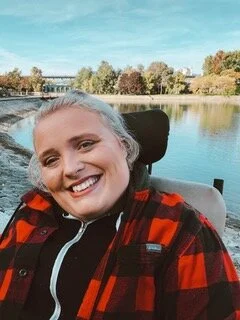In October 2020, CHILD-BRIGHT’s National Youth Advisory Panel (NYAP) launched an innovative youth consultation service. Youth member Gillian Backlin accepted the first consultation mandate external to CHILD-BRIGHT and shares her experience consulting with the Partnering for Pain and iOuch research teams in the winter of 2021, as well as her thoughts on why it was a valuable experience for all involved.
“I’m happy to share that the NYAP has completed its first consultation!” says Gillian Backlin. “Our consultation service provides researchers with the opportunity to connect with youth with brain-based developmental disabilities, like myself, who offer first-hand knowledge and experience to their research studies.”
In fall 2020, the Partnering for Pain and iOuch research teams approached the NYAP with a request for consultation focused on virtual care during the pandemic as part of a project funded by the Ontario SPOR SUPPORT Unit. The knowledge mobilization project aims to ensure equity and inclusion in virtual care and identify best practices to support diverse populations of youth with chronic pain. The team’s objectives were:
To facilitate collaborative dialogue regarding virtual care recommendations for diverse pain populations, including youth with pain and complex medical care needs, and their families.
To engage diverse stakeholder groups in contributing to recommendations for virtual care best practices in pediatric chronic pain.
To share findings related to identified virtual care recommendations with relevant stakeholder groups and explore how these recommendations could be tailored to best address the needs of vulnerable pain populations.
To help reach these objectives, the team was looking to consult with a young adult living with pain and complex medical care needs (including brain-based developmental disabilities) to co-design and co-lead a collaborative dialogue session with youth to explore their experiences with virtual care.
“Following the review of their consultation service request, my fellow NYAP members and I decided that I would be best suited to meet with this team,” notes Gillian. “As someone who deals with chronic health issues that now have to be treated virtually, I was able to provide insight from my own personal experience that resonated with other participants. I was really excited to get the opportunity to use my experience to help others.”
This study team brought together many different groups for several virtual sessions, such as Black youth living with painful sickle cell disease, Indigenous youth with chronic pain, youth with pain and complex medical needs (including those with brain-based developmental disabilities), as well as their family members and healthcare professionals. “I took part in the planning meetings that brought these many stakeholders together, joined a call with parents of youth with complex care needs, and helped facilitate a discussion with youth with complex care needs,” explains Gillian.
“ “Gillian’s involvement was crucial. She helped us develop both the content and structure for our virtual engagement sessions. Her feedback was also critical in ensuring the sessions were accessible for youth living with complex medical needs across Canada.” ”
“On my end, I found the team’s genuine interest in creating a fruitful and accessible discussion for all made this process comfortable and enjoyable from start to finish,” says Gillian. “The great thing about this study was that it was an open conversation that allowed for the sharing of experiences and different points of view. It is my hope that this feedback will encourage care providers to continue to do their part in ensuring that the virtual care patients are receiving meets their specific needs.”
Learn more about the project here.



